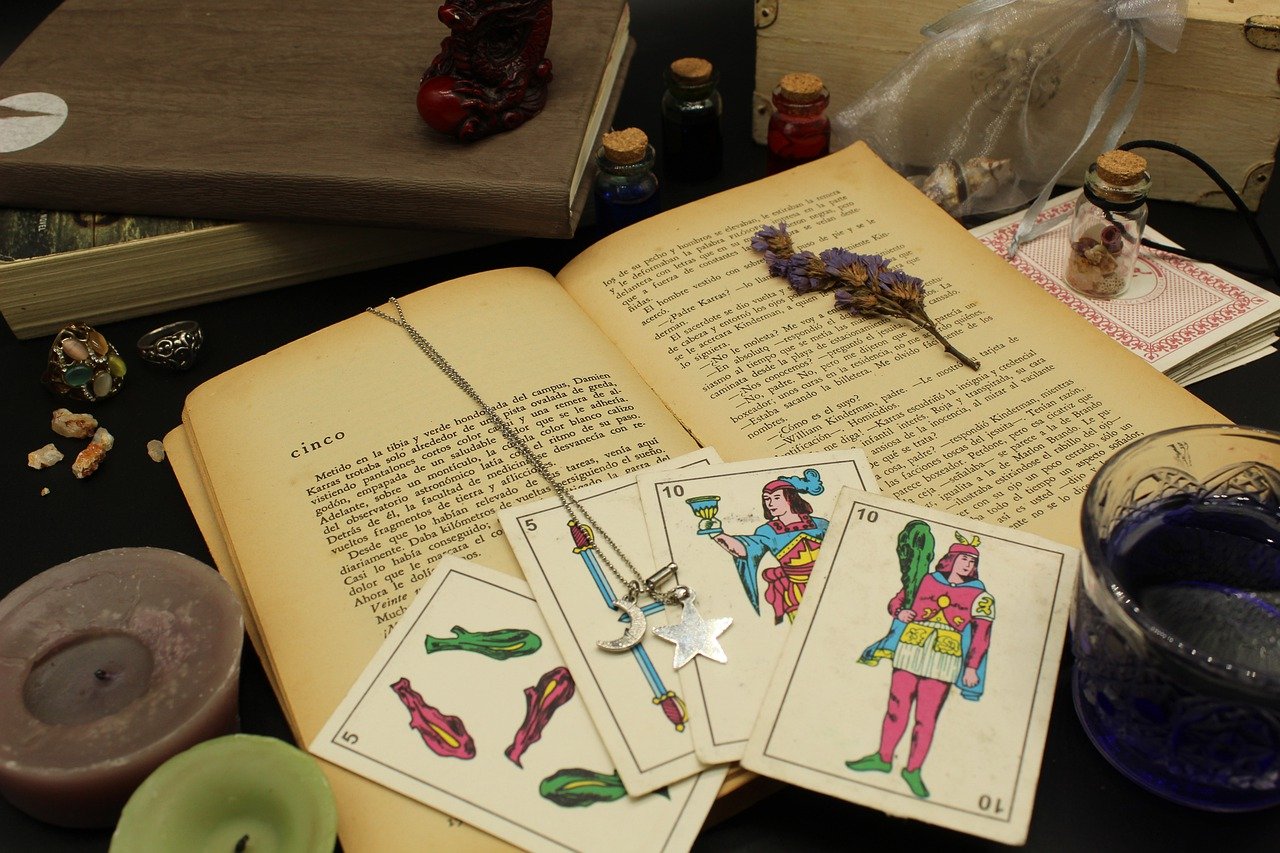Divination is one of the basic schools of magic. It involves spells that mainly work to see faraway events, predict the future, and better understand the past. In the sections below, we will cover some of the best divination spells available, which classes have access to them, and how they work.
Table of Contents
Cantrip
Cantrips are available to full casters starting at level 1. For half-casters and quarter-casters, cantrips are usually not available without taking the Fighting Style Blessed Warrior or a feat.
Guidance
You should take guidance. There’s no reason not to take it, and it is likely the best cantrip in the entire game. It’s that good. It’s a concentration spell, but since it is meant for use outside of combat, it rarely matters. Someone performing a Wisdom (Perception) check? Give them guidance. If you have a surprise round or can prepare before combat, cast guidance on someone to give them an extra 1d4 to their initiative roll.
Available to Clerics, Druids, Artificers
Level 1
Level 1 spells are available to full casters beginning at level 1. For half-casters and quarter-casters, they become available between levels 2-3
Gift of Alacrity
This dunamancy spell is pretty nifty. One target gains a bonus of 1d8 on their next initiative roll. The divination spell lasts for 8 hours and doesn’t require concentration, so if you’re willing to burn a spell slot every day, you can ensure that your Rogue or another ally will go first in a fight.
Available to Wizards (Chronurgy Magic)
Hunter’s Mark
Before the optional feature Favored Foe was introduced, this was the primary divination spell that every ranger wanted. It still is mathematically superior to Favored Foe since you apply the bonus damage to every attack instead of only one attack per round. It’s also helpful if you’re facing a foe that might conceivably run away and need to track it.
Available to Rangers and Oath of Vengeance Paladins
Identify
This is a great divination spell to have if you can cast ritually. Otherwise, you might find your party haphazardly collecting potentially magical items that you can only guess at. Many items can be partially identified with a high Intelligence (Arcana) roll, but only an identify spell can find cursed items.
Available to Bards, Wizards, Knowledge and Forge Domain Clerics, Artificers
Level 2
Level 2 spells are available to full casters starting at level 3. For half-casters, they start at level 5. For quarter-casters, they become available at level 7.
Borrowed Knowledge
Unfortunately, this divination spell has a range of self, meaning that you can’t use it to target someone else. However, it still has plenty of uses. You can give yourself proficiency in a skill that you don’t already have. If you, or someone else, then casts enhance ability or skill empowerment, you could end up with advantage and/or expertise in something that normally your character knows nothing about. It lasts for an hour and doesn’t require concentration, but it has to be a skill. This spell doesn’t allow you to suddenly learn to use a set of tools or know a language.
Available to Bards, Clerics, Warlocks, Wizards
Fortune’s Favor
This divination spell is kind of like giving someone a luck point from the Lucky feat. It’s amazing, although it’s quite expensive for its level (the spell consumes a pearl worth 100gp) so at lower levels, you’ll want to save this for super important things. Essentially, whenever your target rolls 1d20 (on an attack roll, saving throw, or ability check), they can dismiss the spell to roll another d20 and choose which result to use. Alternatively, they can force another person to reroll a d20 after hearing the result of the roll.
If the original roll has advantage or disadvantage, this spell applies after the roll has already been made. If you cast it at higher levels, you can give multiple targets this spell, but you can’t give one target multiple rerolls.
Available to Wizards (Chronurgy and Graviturgy)
See Invisibility
Remember how good invisibility is? Negate that with this divination spell.
Available to Bards, Sorcerers, Wizards, Artificers, Oath of the Watchers Paladins, Twilight Domain Clerics
Level 3
Level 3 spells are available to full casters starting at level 5. For half-casters, they start at level 9. For quarter-casters, they become available at level 13.
Tongues
When your character has high Charisma, you’re probably the face of your party, so you need to understand other languages and make yourself understood. You might even divert a fight or two by just talking it through with this divination spell.
Available to Bards, Sorcerers, Clerics, Warlocks, Wizards
Level 4
Level 4 spells are available to full casters starting at level 7. For half-casters, they start at level 13. For quarter-casters, they become available at level 19. This is the highest level for quarter-casters.
Arcane Eye
A fantastic scouting divination spell that lets you peek into the next room over and see what you should prepare for. The arcane eye has darkvision, even if your character doesn’t, which can help you navigate dark areas. What’s especially interesting is that the conjured eye can look in every direction, so you don’t have to worry about something sneaking up behind your party and catching you all unawares.
The eye can even move through tiny spaces and can move as far away from you as you want without impeding your vision. However, the DM will require you to make Wisdom (Perception) checks to see with it.
Available to Wizards, Artificers, Arcana and Knowledge Domain Clerics
Level 5
Level 5 spells are available to full casters starting at level 9. For half-casters, they start at level 17. This is the highest level for half-casters.
Legend Lore
This is an expensive spell and not something that you need to have prepared every day. We recommend that prepared spellcasters take this spell instead of learned casters. You need 200gp of ivory (which can be reused) and 250gp of incense (which the spell consumes), but the knowledge you learn from the spell might be crucial for your campaign. You name a legendary person, place, or thing and automatically learn stuff about it. The more you know about what you seek; the more detailed and precise your learned info will be.
DMs can’t use this divination spell to trick you because the spell’s text notes that the information you learn is totally accurate. However, they might give you the knowledge in the form of a riddle or some obscure puzzle if they don’t want to give away too much too soon.
Available to Bards, Clerics, Wizards, Undying Warlocks
Rary’s Telepathic Bond
One of the main issues that adventuring parties frequently run into is a lack of in-character communication. Talking to your friends about your plans out of character is fine, but using that knowledge in ways that your character wouldn’t be able to (such as knowing that your friend is dying behind a pillar that your character can’t see) is called meta-gaming, and most groups discourage it. While this divination spell wouldn’t solve the example problem, it does enable everyone to communicate telepathically. If your character was gagged, on the brink of unconsciousness, inside a Silence spell, or in a situation where it would be awkward to share crucial information out loud, they could think it to the other players.
Available to Wizards, Peace Domain Clerics
Commune
Commune, one of the central divination spells for clerics, allows you to ask your deity three questions and receive yes or no answers. It’s essential to consider the answer restriction, though, because your divine guidance won’t specify, explain, or direct you. For example, you can’t ask how far your rival is, the direction the dragon is flying, or where the secret door is. Additionally, deities in D&D aren’t omniscient, so your god may reply with “Unknown,” depending on the question. Given those restrictions, it is still a fantastic spell.
Available to Clerics, Oath of Devotion and Oath of Glory Paladins
Scrying
While technically a situational divination spell, you’ll likely find that the situations calling for scrying are far more frequent than you’d think. Scrying has many uses, such as checking on known antagonists, beloved NPCs, political rivals, or someone you’re planning to assassinate. The spell doesn’t consume the material component, so you only need to worry about the initial cost. If you can get ahold of something that belongs to the target, your spell is much more effective. Creatures that can see invisible things will know that you’re spying on them, but that’s uncommon.
Available to Bards, Clerics, Druids, Warlocks, Wizards, Oath of Vengeance and Oath of the Watchers Paladins
Commune With Nature
The druidic version of commune, this divination spell lets you ask your surroundings for information about local monsters, safe places to spend the night, if there are any nearby towns, or if the environment has detected a rift between the planes of existence.
Available to Druids, Rangers, Oath of the Ancients and Oath of the Open Sea Paladins
Level 6
Level 6 spells are available to full casters starting at level 11.
True Seeing
Seeing through all illusions and automatically succeeding on saving throws against them is never bad. You can also see through magical darkness and into the Ethereal Plane.
Available to Bards, Clerics, Sorcerers, Warlocks, Wizards
Level 9
Level 9 spells are available to full casters starting at level 17.
Foresight
This divination spell turns every encounter and obstacle into a joke. For eight hours, you or an ally can glimpse the future. They have advantage on all rolls, and other creatures have disadvantage when attacking them. Note that it takes a minute to cast, though, so you can’t cast it in the middle of combat.
Available to Bards, Druids, Wizards, Warlocks


